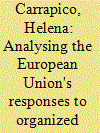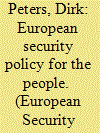| Srl | Item |
| 1 |
ID:
134074


|
|
|
|
|
| Publication |
2014.
|
| Summary/Abstract |
In the past 30 years, organized crime (OC) has shifted from being an issue of little, or no concern, to being considered one of the key security threats facing the European Union (EU), the economic and political fabric of its society and its citizens. The purpose of this article is to understand how OC has come to be understood as one of the major security threats in the EU, by applying different lenses of Securitization Theory (ST). More specifically, the research question guiding this article is whether applying different ST approaches can lead us to draw differing conclusions as to whether OC has been successfully securitized in the EU. Building on the recent literature that argues that this theoretical framework has branched out into different approaches, this article wishes to contrast two alternative views of how a security problem comes into being, in order to verify whether different approaches can lead to diverging conclusions regarding the same phenomenon. The purpose of this exercise is to contribute to the further development of ST by pointing out that the choice in approach bears direct consequences on reaching a conclusion regarding the successful character of a securitization process. Starting from a reflection on ST, the article proceeds with applying a "linguistic approach" to the case study, which it then contrasts with a "sociological approach". The article proposes that although the application of a "linguistic approach" seems to indicate that OC has become securitized in the EU, it also overlooks a number of elements, which the "sociological approach" renders visible and which lead us to refute the initial conclusion.
|
|
|
|
|
|
|
|
|
|
|
|
|
|
|
|
| 2 |
ID:
134063


|
|
|
|
|
| Publication |
2014.
|
| Summary/Abstract |
The democratic foundations of European integration in the foreign and defence realm are increasingly being debated. This article looks at the question of democratic legitimacy from one particular angle, by examining public opinion as measured in Eurobarometer surveys between 1989 and 2009. Based on reflections about the relation between polling results and wider questions of democracy, it examines three aspects of public opinion: general support for a common foreign and a common defence policy; differences among support rates in EU member states; and what roles Europeans would prefer for European armed forces. It turns out that general support for a common foreign policy is high, whereas the desirability of a common defence policy is much more contested. Moreover, citizens across Europe would prefer European armed forces to take on traditional tasks, as territorial defence. An EU defence policy that goes beyond strict intergovernmentalism and is directed towards protecting international law and universal human rights would thus require a significant communicative effort to become accepted.
|
|
|
|
|
|
|
|
|
|
|
|
|
|
|
|